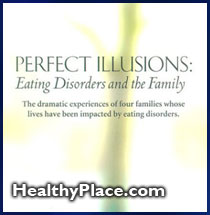Perfect Illusions: Eating Disorders and the Family
There will never be a moment in which you are not you. Some may try to hide their existence away, pretending they are someone they're not, but who is this act for? You know the ultimate truth; there is no hiding from yourself. The difficulty of it lies in our societies' ability to create perfect illusions.
 A young woman named Anna Westin wrote these words in her diary in November 1, contemplating the toll taken by a battle with anorexia that began when she was 17. Anna lost her battle a few months later, after taking a fatal overdose of painkillers. She was 21 years old.
A young woman named Anna Westin wrote these words in her diary in November 1, contemplating the toll taken by a battle with anorexia that began when she was 17. Anna lost her battle a few months later, after taking a fatal overdose of painkillers. She was 21 years old.
Eating disorders are a growing problem affecting millions of people in the United States, most of them young women. This hidden epidemic, which has gained widespread public attention only in recent years, can be lethal. Yet sufferers often don't look as gravely ill as they truly are, and hide their illness behind a "perfect illusion" of normalcy.
The PBS documentary, Perfect Illusions: Disorders and the Family, hosted by Lauren Hutton, is unique in its focus on the role of the family in the evolution and treatment of, and eating disorders recovery.
What are the risk factors? How do you identify early warning signs of eating disorders? Where can families turn during the treatment and recovery process? These questions and more are addressed in this documentary about a challenging situation faced by more people in our society than we might think.
In Perfect Illusions, you will meet 16-year-old Suni, who is in the early stages of what may be a long and difficult fight with bulimia; 26-year-old Marya, who chronicled her 15-year struggle with anorexia and bulimia in the book Wasted; and 20-year-old Annie, who became bulimic during a bout with clinical depression in high school. Thoughtful entries from the diary of Anna tell of her ordeal.
The young women's parents tell about their desperate efforts to help their daughters, and of the fear, confusion and frustration they've faced trying to deal with a problem that has no single cause. Perfect Illusions includes interviews with specialists in the treatment for anorexia and treatment for bulimia, and visits a support group for the parents of those suffering from eating disorders.
Suni, Marya, and Annie talk candidly about their experiences, recalling how their eating disorders began in response to pressures and stresses in their lives. The women describe how eating disorders forced them into a life of secrecy and evasion.
Annie's parents didn't find out about her bulimia for four years, until their daughter was a sophomore at college 2,000 miles from home, and a sorority sister called to alert them to the problem. Marya started making herself throw up when she was nine years old, but her parents didn't learn about it until they visited her in boarding school and found their 14-year-old daughter "skeletally thin."
Perfect Illusions is an unprecedented exploration of the role family issues and societal pressures can play in eating disorders. Annie describes the obligation she felt to live up to what she perceived as the expectations of her family: "There were a lot of 'shoulds' in my life. 'I should do this, and in order to be a good person, I need to do this. It was... my pattern of constantly feeling like I needed to live up to something."
The documentary also examines the traumatic impact of anorexia and bulimia, on the sufferers' loved ones. Marya's parents talk about the agonizing day they placed their daughter in an institution for teens with mental and emotional problems. Families not only deal with the deadly nature of the disease and the threat to their children's lives, but also with the guilt of real and perceived responsibility.
Anna's best friend, who also fought anorexia, remembers her shock when she visited Anna in the hospital: "My heart is just totally broken, because she just didn't look at all like herself or how I had ever remembered her... it just crushed me."
The documentary is an exploration of the role that family issues play in eating disorders and the pressures exerted on these young women to live up to what they perceive as the high expectations of their family and society. It also examines the traumatic impact of anorexia, bulimia and binge eating on the sufferers' loved ones. Families deal not only with the deadly nature of the disease and the threat to their children's lives, but also with the guilt of perceived responsibility.
The treatment of anorexia and bulimia can also exact a high financial cost. In most states, insurance companies deny coverage for long-term in-patient care for eating disorders. Often parents must cover the costs themselves. Anna's parents believed their insurance company's denial of treatment contributed to Anna's death. They helped spearhead a Minnesota lawsuit that resulted in a landmark settlement against the company. They used their one million dollar award to establish a residential treatment center for eating disorders.
While recovery can be a challenge, treatment for eating disorders is completely effective in many cases. For some, the road is complicated and hard. Recovery takes more than will power. There can be a complex interaction between family, brain chemistry, personality, genetics, and individual history. New research on genetic and biochemical factors may shed light on causes and treatment in the future. Research is ongoing in many areas and the outcome offers increased hope for sufferers and their loved one.
Watch video clips:
- The Deepest Secret
In a society that promotes the image of being thin, it is difficult for these women to reconcile... - I Really Was That Crazy... It Wasn't A Joke Anymore
I realized they were talking about putting me in a mental institution for good... - I Wanted To Be Perfect
It seemed to me children ought to be adults... - Family Therapy
Annie is now in individual therapy; this has become a source of conflict... - After Family Therapy
After two days of family therapy, Saras is looking at herself, and her family relationships, differently... - In Most States, Insurance Companies Deny Coverage
- The insurance company, who had never talked to Anna, had never seen her, didn't know anything about her...
Perfect Illusions: Eating Disorders and the Family is available on VHS and DVD at Channel9Store.com or by calling 1.800.937.5387
©2003 KCTS Television
next: Appearances Fail to Paint Whole Picture
~ eating disorders library
~ all articles on eating disorders
APA Reference
Gluck, S.
(2007, April 22). Perfect Illusions: Eating Disorders and the Family, HealthyPlace. Retrieved
on 2026, January 9 from https://www.healthyplace.com/eating-disorders/articles/perfect-illusions-eating-disorders-and-the-family



